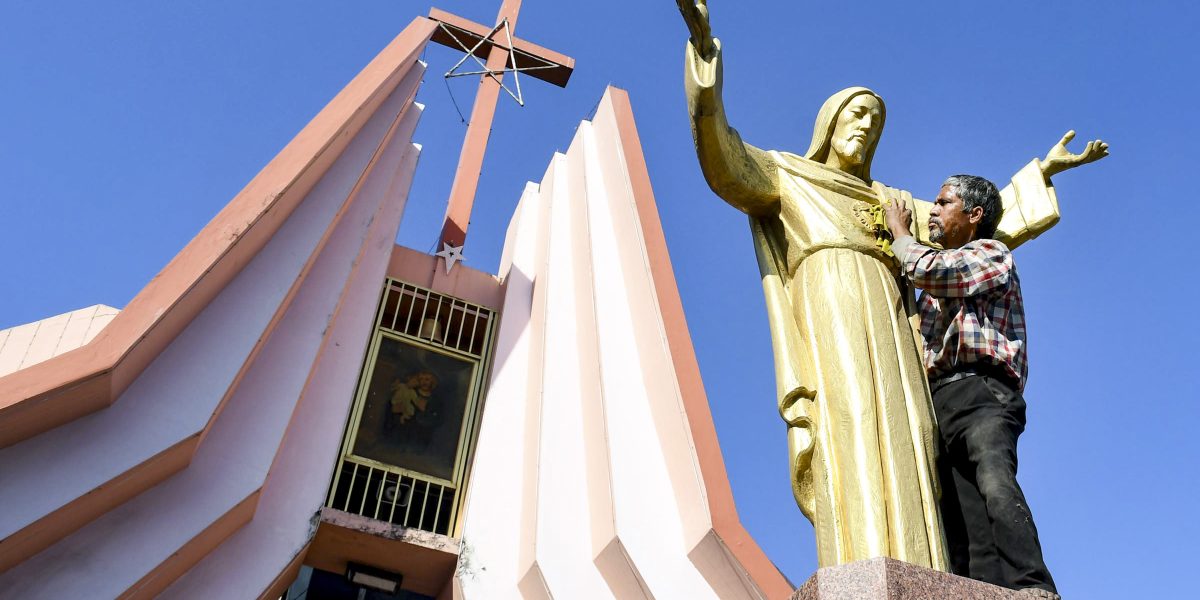
The myth of ‘love jihad’, slayed repeatedly and supposedly laid to rest, rises yet again.
A hydra-headed monster that’s revived time and again by a not-so-subtle conspiracy between Hindutva forces, the executive, and the judiciary, it is making yet another come back at the close of 2022.
This time its a multi-pronged effort, starting in March with a new anti-conversion law in Haryana, followed by Karnataka on September 30 with its Protection of Freedom of Religion Act, 2022, and wrapping up the year with the Uttarakhand governor’s assent to making the draconian Uttarakhand Freedom of Religion Act, 2018 even more stringent, the Maharashtra Cabinet’s notification to snoop on interfaith marriages and relationships, and the Supreme Court eagerly trying to wade in on the wings of a fourth-attempt petition by a serial litigator from the BJP.
Currently the tally of states with ‘love jihad’ laws is 11, but keeping count is becoming difficult.
Some, like Himachal in 2019 and Gujarat and Madhya Pradesh in 2021, have enacted stringent new replacements for their old ‘Freedom of Religion’ Acts, aimed especially at preventing Hindu women from marrying outside the faith.
Orissa (1967), Chhattisgarh (1968), Arunachal Pradesh (1978) and Jharkhand (2017) have statutes to control religious conversions, but those Acts do not enter the private sphere of marriage.
The newcomers to the party, Uttarakhand (2018), Uttar Pradesh (2020), Karnataka (2021), and Haryana (2022) unabashedly made laws with the avowed purpose of fighting what they described as a “growing trend of love jihad.”
And of course, there are other BJP-ruled states like Maharashtra, testing the waters with a notification to pry and snoop and unleash the police force on hapless young people wanting to marry outside their faith, and extending this intrusion to “relationships” also.
This spate of legislation is sought to be justified on grounds of allegedly increasing, or even rampant, instances of Muslim men marrying Hindu women.
The Statement of Objects and Reasons accompanying the Uttarakhand Bill informed legislators that “there have been umpteen cases of religious conversions, both mass and individual”.
It also stated that
“…[W]ith an agenda to increase strength of their own religion by getting people from other religions converted to their own religion, people do marry girls of other religion by misrepresentation of their own religion…”
It further said:
“Several instances came in notice that people convert themselves to the other religion only for the purpose of marriage with the girl of that religion and after marriage they got that girl converted into their own religion”.
Based on these ‘instances,’ the Uttarakhand legislature made a law that not only criminalises love and inverts the burden to proof, but even allows interfaith marriages to be declared null and void if they result in conversion before or after the marriage. These sentiments were echoed by sundry chief ministers and others while introducing similar Bills in other states.
These alarmist, often incendiary, allegations of ‘love jihad’ have been a prelude to each one of the recent anti-conversion laws, but in no case have any actual facts, figures, or statistics been cited.
It therefore needs to be seen whether there is, or ever has been, any real evidence to support these claims.
Early cases
The phrase ‘love jihad’ was coined in 2009 at the Catholic Bishops Council in Kerala, when a Bishop claimed without evidence that a large number of Catholic girls were being lured into marriage by Muslim boys. But it gained currency due to two unconnected cases in the Kerala and Karnataka high courts, each arising from police complaints filed by the fathers of girls who claimed that their daughters had been kidnapped and then forced to marry Muslim youths.
Dealing with a plea for anticipatory bail by two Muslim boys, Shahan Sha and Sirajuddin, accused of converting and then marrying a Christian and a Hindu girl, Justice K.T. Sankaran of the Kerala high court passed a lengthy order on September 29, 2009, rejecting bail on grounds that it was, “Well known that there was a movement known as Love Jihad or Romeo Jihad.”
He directed the DGP of Kerala to file an affidavit answering eight questions on whether such movements existed, which organisations in India and abroad were involved, how the movement is funded, whether it has an all-India basis, how many students had been converted to Islam in the past three years, and whether there is any connection between ‘the love jihad movement’ and counterfeiting, smuggling, drug trafficking and terrorist activities.
Having denied the boys anticipatory bail, the judge directed that copies of his order be served on the Additional Solicitor General of India as well as the Secretary, Union home ministry, with directions to file an immediate response.
Almost simultaneously, on October 21, 2009, a bench of the Karnataka high court passed an interim order on a habeas corpus petition filed by C. Selvaraj, alleging that his daughter Silja Raj had been abducted by a Muslim boy and taken from Chamrajnagar to Kerala to study Islam at a madrassa, convert, and get married. Though Silja Raj appeared and informed the court that she had converted and married of her own free will, the division bench set up a Special Investigation Team supervised by the DGP of Karnataka to investigate “the larger conspiracy of the love jihad movement”, and directed Silja Raj to stay with her parents until the SIT made its report to the court.
This story was originally published in livelaw.in . Read the full story here





